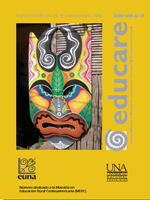Caracterización de la situación idiomática de los pueblos indígenas de Costa Rica y su influencia en su educación
DOI:
https://doi.org/10.15359/ree.12-Ext.6Keywords:
indigenous education, autochthonous languages, cultureAbstract
This essay shows the reality of Costa Rican indigenous groups in terms of the mastery and promotion of their original tongue and the way this has been taken into account in the design of the curricula of their schools. In general, it is discussed that the educational process is developed disengaged of the idiomatic and cultural reality of these groups, even tough government efforts have been made in this direction. As a result of this educational deficiency, a cultural decline is generated that might end up with the loss of native languages.
References
Constenla, A. (1994). Estado de situación de las lenguas indígenas de Costa Rica. Ponencia presentada
en el Seminario en la Universidad de Costa Rica, San José, Costa Rica.
Costa Rica. Ministerio de Educación Pública [MEP]. Departamento de Educación Indígena [DEI].
(1995). Diagnósticos socioculturales indígenas. Estados de situación. San José, Costa Rica:
CENADI-DEI-MEP.
Santa Cruz, M., y van der Lat, C. (2007). Estado de la situación educativa de la niñez y adolescencia
indígenas de Costa Rica. San José: UNICEF.
Downloads
Published
How to Cite
Issue
Section
License
1. In case the submitted paper is accepted for publication, the author(s) FREELY, COSTLESS, EXCLUSIVELY AND FOR AN INDEFINITE TERM transfer copyrights and patrimonial rights to Universidad Nacional (UNA, Costa Rica). For more details check the Originality Statement and Copyright Transfer Agreement
2. REUTILIZATION RIGHTS: UNA authorizes authors to use, for any purpose (among them selfarchiving or autoarchiving) and to publish in the Internet in any electronic site, the paper´'s final version, both approved and published (post print), as long as it is done with a non commercial purpose, does not generate derivates without previous consentment and recognizes both publisher's name and authorship.
3. The submission and possible publication of the paper in the Educare Electronic Journal is ruled by the Journal’s editorial policies, the institutional rules of Universidad Nacional and the laws of the Republic of Costa Rica. Additionally, any possible difference of opinion or future dispute shall be settled in accordance with the mechanisms of Alternative Dispute Resolution and the Costa Rican Jurisdiction.
4. In all cases, it is understood that the opinions issued are those of the authors and do not necessarily reflect the position and opinion of Educare, CIDE or Universidad Nacional, Costa Rica. It is also understood that, in the exercise of academic freedom, the authors have carried out a rogorous scientific-academic process of research, reflection and argumentation thar lays within the thematic scope of interest of the Journal.
5. The papers published by Educare Electronic Journal use a Creative Commons License:















 The articles published by Educare Electronic Journal can be shared with a Creative Commons License:
The articles published by Educare Electronic Journal can be shared with a Creative Commons License: 



